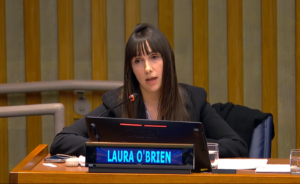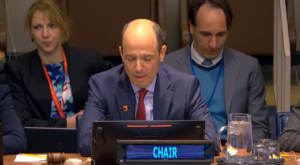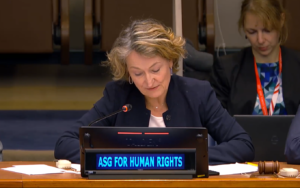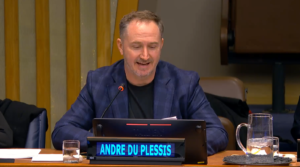Informal Meeting at the UN Headquarters organized by the
Third Committee of the UNGA “Civil Society – UN Eyes and Ears”
On January 29, 2024, HRN participated in an informal briefing to Member States and NGOs, reflecting on the work achieved and the resolutions adopted in the Third Committee of the UN General Assembly in autumn 2023 and on the General Assembly’s overall theme for the remainder of the 78th session, pertaining to the ‘New and Emerging Technologies’.
To-date, three entirely new resolutions have been adopted by the Third Committee in the current session, including on enhancing the contributions of the Commission on Crime Prevention and Criminal Justice to the accelerated implementation of the 2030 Agenda for Sustainable Development; on equal access to justice for all; and most notably a pathbreaking resolution 78/213 entitled “Promotion and protection of human rights in the context of digital technologies” adopted by consensus on 22 December 2023 (see https://www.undocs.org/A/RES/78/213). Most of the briefing addressed aspects of this resolution 78/213 which is not only notable in its wide scope but also as it effectively brings the human rights agenda of the HRC to the General Assembly, the most universal, high-level body of the UN.
Speakers at the briefing expressed their expectations that resolution 78/213 contribute to the so-called “Global Digital Compact” to be negotiated this spring (facilitated by Sweden and Zambia) in which Member States will lay down key principles on digital technologies, the Internet and the many human rights and online safety principles. The Global Digital Compact will form an integral part of a “Pact for the Future” to be adopted by the Summit of the Future in New York in September 2024. The Compact aims to govern the digital future in line with universal human rights and rights-based aspects of the Sustainable Development Goals. Against this background, the present briefing encouraged Member States, civil society organizations (CSOs), and stakeholders to engage in these discussions at the global level.
While the focus was on this specific resolution, the briefing reported that the Third Committee adopted more than 60 resolutions in the current session, covering a wide range of issues such as the rights of children, the advancement of women, refugees, social development, multiple country-specific resolutions, and more.
The meeting heard interventions from the Chair of the Third Committee, H.E. Alexander Marschik, Vice-President of the UN General Assembly, Mr. Peter Mohan Peiris, on behalf of the President of the Assembly H.E. Mr. Dennis Francis, and Assistant Secretary-General for Human Rights, Ms. Ilze Brands Kehris.
The President H.E. Mr. Francis recognized the crucial role of the CSOs like HRN that: “Civil society is our eyes and ears as the nature of the work they do brings them closest to the field. They are much more informed and how the often disregard the human rights play out in the lives of many on the ground and how those who dare to say something when they see something face reprisals for speaking up. This is why the voices of stakeholders, civil societies, private sectors, and academia are indispensable in fortifying the intergovernmental deliberations at the United Nations.”
The President and the ASG Ms. Brands Kehris recognized the urgent need for a transparent and accountable AI governance framework to mitigate colossal risks such as internet shutdowns, repression, surveillance, censorship, manipulation of information, intrusion on privacy, affecting the right to non-discrimination and equal protection for human rights defenders. The President and the ASG further urged social media companies to conduct the Guiding Principles of Business and Human Rights (UNGPs)’s human rights due diligence (HRDD) of their products, processes, business operation models, and data collection methods, processing, and practices, especially the role of algorithms and ranking systems in amplifying disinformation and hate speech.
The Office of the President (OPGA) has appointed two focal points to maintain contacts with civil societies, called ‘Ask PGA’ platform which accepts questions, see: https://www.un.org/pga/78/askpga
The ASG recognized that vulnerable groups, including women, children, and minorities, were particularly exposed to digital harassment that may lead to offline physical violence. The OHCHR has conducted studies on these issues in numerous projects, including the B-tech project, HR defenders, environmental defenders, LGBTQ, women, girls, young peoples, religious groups, civil societies, as well as in the context of the digital divide. The ASG announced that the Cyber Crime Convention negotiation has entered the concluding stage. The Convention will establish the scope of crime and set standards for surveillance and cross-border data exchange.
The representatives of Outright International, Mr. Andre du Plessis, and AccessNow, Ms. Laura O’Brien spoke on behalf of the coalition of 14 CSOs. Mr. du Plessis commented that States should consider implementing legislation that protects human rights violations in the digital context and eliminates discrimination in political participation on grounds of sexual orientation and gender identity. He also urged the UN for greater inclusion of the CSOs.
 Ms. O’Brien expressed that the coalition welcomed this new resolution, which would strengthen the issues of targeted surveillance, commercial spyware, biometric data and digital public infrastructure, and applications of AI through discussion fora such as the Global Digital Compact, the Cyber Crime Treaty, and the High-level Advisory Body on AI. Third Committee must facilitate this cooperation and coordination among stakeholders and CSOs to achieve coherence and to ensure that human rights are central in the discussion.
Ms. O’Brien expressed that the coalition welcomed this new resolution, which would strengthen the issues of targeted surveillance, commercial spyware, biometric data and digital public infrastructure, and applications of AI through discussion fora such as the Global Digital Compact, the Cyber Crime Treaty, and the High-level Advisory Body on AI. Third Committee must facilitate this cooperation and coordination among stakeholders and CSOs to achieve coherence and to ensure that human rights are central in the discussion.
Member States such as Poland, Mexico, Cuba, Colombia, and US urged for increasing the diversity of CSO voices, especially those from developing countries and suggested that the Third Committee expand its reach by leveraging new technologies.
Representatives of CSOs, including International Service for Human Rights, Amnesty International, and Parents House Foundation, called on Member States and the Third Committee to consider a resolution to protect defenders and against reprisals, especially women and children. They also suggested using modern technologies to better engage diverse voices, and ultimately called for a reform of the relationship between the UN and CSOs here in New York, more in line with the practice at the UN in Geneva.
Syria Arab Republic highlighted the infrastructure gaps in terms of energy, electricity and the Internet, and asked for support from developed countries in closing the gaps. It cautioned against illegal operations of some NGOs.
Along similar lines, CEFAM cautioned that new and emerging technologies should not be used as political weapons to impose majority opinions of what is considered good. The UN must allow space for a wide variety of views.
In summary, major developments are happening in the UN General Assembly which may open up new avenues for engagement for the protection of human rights across the entire spectrum of development, design, transfer, and use of digital technologies, infrastructures, and new artificial intelligence capabilities. HRN will keep you posted.






